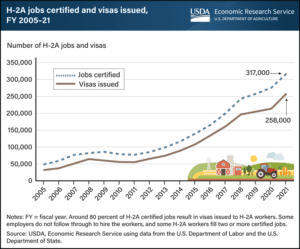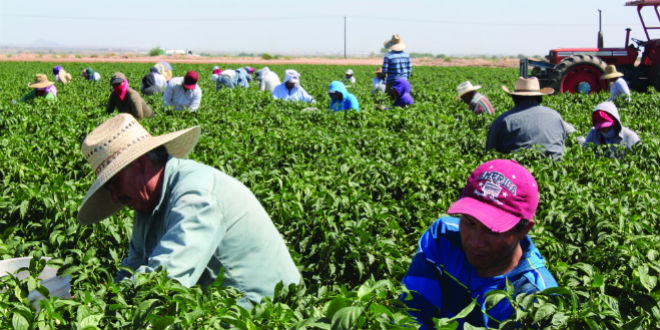Oct 7, 2022Final H-2A rule tightens compliance, housing provisions
The Department of Labor has released its final rule for the H-2A temporary labor program, which is increasingly being used by specialty crop farmers as labor shortages force them to turn to the federal program to ensure workers are available for harvests and other farm needs.
The final rule, which is available on the Federal Register, won’t be officially published there until Oct. 12, and it becomes effective Nov. 12.
Changes to the program include governmental authority to ban some people from the program for misconduct, upgrades to worker housing requirements and inspections, updates to bond requirements for labor contractors, mandatory electronic filing for most applications, and changes to how wages are determined.
“By improving H-2A program regulations, we are strengthening worker protections, meeting our core mission,” Secretary of Labor Marty Walsh said in the department’s announcement of the final rule. “Today’s new rule makes several improvements to enhance the integrity of the H-2A program and provide employers and other stakeholders greater clarity.”
Major changes to the rule, as identified by the labor department:
- Improves safety and health protections for workers housed in rental or public accommodations.
- Streamlines and updates bond requirements for labor contractors to better hold them accountable and clarifies joint-employer status for employers and associations.
- Clarifies the housing certification process to allow state and local authorities to conduct housing inspections.
- Establishes explicit authority to debar attorneys and agents for their misconduct, independent of an employer’s violations.
- Makes electronic filing mandatory for most applications to improve employers’ processing efficiency.
- Modernizes the methodology and procedures for determining the prevailing wage to allow state workforce agencies to produce more prevailing wage findings.
The changes in the final rule will also support the enforcement capabilities of the department’s Wage and Hour Division to address H-2A program fraud and abuse that undermines workers’ rights and hurts law-abiding employers, according to the Labor Department.
Read the unpublished final rule to amend H-2A temporary labor certification regulations at the Federal Register.
Throughout the U.S., Wage and Hour Division violations of H-2A regulations and recovery of back wages have increased significantly over the past five years. In 2021, the Wage and Hour Division found H-2A violations in 358 cases and collected more than $5.8 million in back wages for more than 7,000 workers.
H-2A use rises rapidly


According to the U.S. Department of Agriculture’s Economic Research Service, the DOL certified about 317,000 temporary jobs in fiscal year 2021, more than six times the number certified in 2005 (see chart).
About 20%, however, did not result in a visa being issued (about 258,000 jobs were filled). According to the USDA, some employers do not follow through and hire the workers, and some H-2A workers fill two or more certified jobs.
The H-2A program continued to expand in FY 2020 despite the jump in U.S. unemployment caused by lockdowns associated with the COVID-19 pandemic.
Six states accounted for about half of the certified H-2A jobs filled in 2021: Florida, Georgia, Washington, California, North Carolina and Louisiana. Nationally, the average H-2A contract in FY 2020 offered 24 weeks of employment and 39.3 hours per week at an average hourly wage of $13. This chart updates information in the ERS bulletin The H-2A Temporary Agricultural Worker Program in 2020, published in August 2022.















